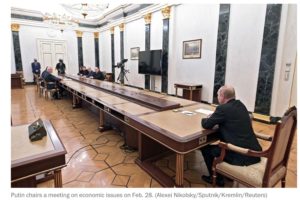Putin: A Case-Study of Isolated, Fear-Based Leadership
Not long after the invasion of Ukraine, Philip Bump of The Washington Post wrote about the isolation – both figurative and literal – of Russia’s president, Vladimir Putin. This article included pictures of Putin physically separated from people by an awkward distance that would make dialogue difficult and relational connection impossible.[1]
What these pictures imply is what a majority of people believe to be true about Putin: he is a narcissist with great power and a great fear of people. He cannot get close to people. He fears people and is far more comfortable being in the center of his universe. In a choice between isolation and connection, Putin chooses isolation every time.
Isolated Leadership in the Church
Unfortunately, leadership in isolation is all too common in our world today. From fearful, narcissistic dictators to detached CEOs, it is not hard to find leadership displayed as the fear-based wielding of power from a distance, over relationally leading through influence with trust.
Unfortunately, I cannot write that churches do much better. An example (seemingly extreme, but I would argue not too far off) that has been center stage in the dialogue on unhealthy church leadership is The Rise and Fall of Mars Hill Podcast by Mike Cosper. In episode 11, Cosper highlights that as issues at Mars Hill were going from bad to worse, Lead Pastor Mark Driscoll would become increasingly isolated and inaccessible to the Mars Hill staff by changing his office location and contact info. At one point, he told his leadership team at a retreat that he and his wife were playing a word association game. During this game, his wife, Grace, said the phrase “people are” to which Mark responded “dangerous.”[2]
Mark Driscoll is an example of a narcissistic pastor who led with fear – both fear of him by the people he led as well as his own fear of people – and wielded power from a distance. The unfortunate reality is that this leadership tactic works. Granted, it does not work forever, but it works in the short-term.
RARE Leadership
In their book RARE Leadership, Marcus Warner and Jim Wilder highlight that “The advantage of the fear-based systems is that they accelerate quickly (but I have to get mad and yell to get anyone to move), while the disadvantage is that under any tension at all they lose mutual mind and forget entirely about acting like themselves.”[3] Instead of a fear-based leadership style, Warner and Wilder advocate for a joy-based system, which “has amazing resilience, focus, direction, and self-restoring capacity.”[4]
How does one create such a joy-based system? This is the focus of their book. RARE Leadership is about creating an environment based on a leadership style of connection, trust, and joy. When one leads with emotional intelligence and maturity, the results of the people one leads experience an “increase in trust, joy, and engagement,” which yields greater results.[5]
RARE is an acronym for “remain relational,” “act like yourself,” “return to joy,” and “endure hardship.”[6] In essence, this book argues for the antithetical leadership ethos of narcissistic, fearful and fear-based leaders. Instead, Wilder and Warner advocate for the kind of leadership that is connected with the people one serves and leads.
Stay Connected
Tod Bolsinger, author of Canoeing the Mountains, is also a proponent of leadership that is relational and connected. Instead of choosing isolation, one must lean in and do the sometimes scary and difficult work of connection. Bolsinger writes that when it comes to leading people into unknown territory, one must “start with conviction, stay calm, stay connected and stay the course.”[7] Staying connected, according to Bolsinger, looks like this:
Keep contact. Close the distance with word and touch. When someone writes me an angry email, I call them at home. When someone sends a formal letter of complaint, I invite them for coffee. When people start getting upset, I call a meeting and invite them to talk. The more heated the situation, the closer I want to get to it. Believe me, this is hard. I’m no different than anyone else.[8]
This is a call to us Christian leaders to lean into relationship. Lean into the people we lead. Courageously choose relationship over isolation. Isolation and fear may be effective short-term strategies. But at the end of the day, leading with influence, trust, and relationship is more sustainable, lasting, and healthy for the soul of the people and the leader.
[1] Please forgive the small, low-resolution pictures. To find where the picture came from, see Philip Bump, “Analysis | The Bizarre, Literal Isolation of Vladimir Putin,” Washington Post, February 28, 2022, https://www.washingtonpost.com/politics/2022/02/28/putin-bizarre-isolation/.
[2] Mike Cosper, “The Rise and Fall of Mars Hill Episode 11: Tempest,” ChristianityToday.com, November 12, 2021, https://www.christianitytoday.com/ct/podcasts/rise-and-fall-of-mars-hill/tempest-mars-hill-driscoll.html.
[3] Marcus Warner and E. James Wilder, Rare Leadership: 4 Uncommon Habits for Increasing Trust, Joy, and Engagement in the People You Lead (Chicago: Moody Publishers, 2016), 120.
[4] Ibid.
[5] Ibid. 14.
[6] Ibid. 14-16.
[7] Tod Bolsinger, Canoeing the Mountains: Christian Leadership in Uncharted Territory (InterVarsity Press, 2018), 15.
[8] Ibid. 168.
6 responses to “Putin: A Case-Study of Isolated, Fear-Based Leadership”
Leave a Reply
You must be logged in to post a comment.


David,
Great post. It is unfortunate with what happened with Mark Driscoll, in his younger years he really gave it all. I believe it’s so important pastoral leaders put the focus on Jesus and not the individual. Many of the local churches have struggled with people from the Mars Hill aftermath.
Well done.
Agreed, it is a deeply tragic story of a man who had great charisma as a preacher, but a deep fear of people.
David, I appreciated your highlight on the importance of proximity. It’s a good reminder that beyond leadership principles and theories, there’s a power from simply being with someone and seeing them and/or hearing their voice.
David,
Great post. The examples used (Putin and Mars Hill) were especially insightful and brought the material into sharper focus.
RARE leadership is worthwhile for Christian organizations but I struggle with how it can be implemented in other (secular) organizations. Thoughts?
David,
Your examples of Putin and Mark Driscoll were both very good, and in the case of Driscoll and Mars Hill – sad. Relationships in leadership really are the key. I think it’s easy to isolate ourselves and push people away. We have to be intentional about building those strong relationships as leaders.
I appreciated everything you said in this!
It made me think about this more locally with our business: We have so many people that work for us it feels all but impossible for me to get to know everyone on a more personal level. However… I have to make the time to make personal connections with them. Even if its something small and going up from there.
I am going to try something this week and I’ll circle back with you!
What is one way that you connect with your team?